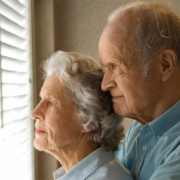Checklist:
When is it time for Alzheimer’s Care?
As so many have experienced, Alzheimer’s is a progressive disease. Symptoms vary with some people experiencing signs in their 40’s, however worsen unpredictably and gradually over time. My mother started having signs of Alzheimer’s in her 60’s, and due to the slow progression, she was able to live alone at home until her 80’s. Research has found that people with Alzheimer’s live from three to even 20 years, experiencing a gradual loss in different skills over time.
In early, stages of Alzheimer’s, when symptoms are milder, many people function well enough to live by themselves or with regular visits by family and friends, just as my mother lived. However, eventually, the disease progresses and Alzheimer’s patients will need round-the-clock care in order to maintain their health, cleanliness and safety.
Has the time come for your family member to receive extra care? This checklist can help:
- Can your family member prepare meals, buy groceries, and maintain personal hygiene? (Refusing to bathe?)
- Is the home disorganized and dirty? (Stockpiling newspapers?)
- Does she forget when take medications, eat, or to turn off the stove? (Cooking incidents?)
- What is her doctor’s assessment? (Go with Dr. visit to ask questions…)
- Can he or she still drive safely? (Or, can’t find the car at the mall?)
- Is the person able to evacuate home independently in case of a fire or other emergencies? (Strange sleeping habits?)
- Has your loved one expressed fear or anxiety about continuing to manage on her own or is asking for more help? (Dependent upon neighbors for rescue?)
- Are you and other family members worrying and becoming increasingly stressed about your loved one?
Each case is unique depending on the stage and family dynamic. Several factors to consider when creating a care plan include cost and feasibility for the person to continue living in her current home. Some families are able to move the relative into an extra bedroom to save money. Others have an extensive support group nearby that can offer meals on wheels. However, most families due to busy schedules turn to Approved in Home Care for an experienced caregiver to help relieve the stress and allowed their loved one to stay at home as the symptoms worsen.
Even when family is available, not everyone has the ability to cope emotionally and physically with an Alzheimer’s patient. Many adult children find it challenging to perform daily care like bathing a parent or helping with toileting. Also, many Alzheimer’s clients feel uncomfortable receiving personal care from their family members.
Call Approved Home Care at (972) 658-4001 for help.





